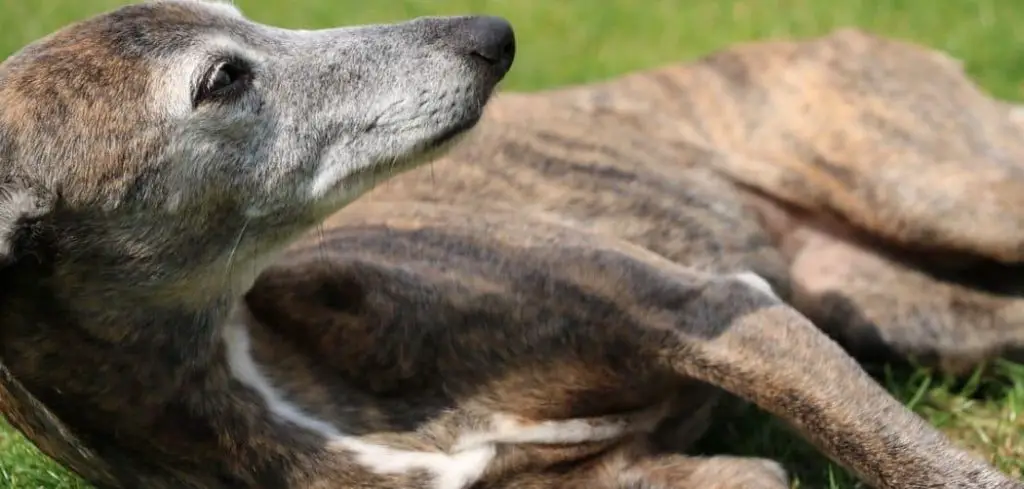Seeing your older dog cough and retch can be alarming, especially when it happens frequently or is accompanied by phlegm, vomiting, or gagging. These symptoms may indicate underlying respiratory, gastrointestinal, or cardiac issues that require attention.
We outline the common causes of coughing and retching in old dogs, what you can do at home, and when to seek veterinary help.
Old Dog Coughing and Retching: Why It Happens
Coughing and retching in older dogs can result from a variety of health concerns affecting the lungs, heart, or digestive system. Chronic bronchitis, tracheal collapse, heart disease, lung infections, and gastrointestinal irritation can all trigger these symptoms.
Retching occurs when the dog gags or brings up mucus, fluid, or even partially digested food, often in response to airway irritation or nausea.
Watching for other signs, such as labored breathing, lethargy, or changes in appetite, can help determine the severity and guide timely veterinary care.

Old Dog Coughing and Retching: Common Causes
Tracheal Collapse
Tracheal collapse occurs when the cartilage rings supporting the windpipe weaken, causing the airway to narrow.
This narrowing often triggers a honking cough and may result in retching as mucus or irritants accumulate.
Symptoms can include difficulty breathing, gagging, coughing when excited or when pressure is applied to the neck, and occasional cyanosis of the gums during severe episodes.
If untreated, tracheal collapse can lead to chronic respiratory distress and secondary infections.
Read more: Dog Coughing and Gagging (Possible Reasons and Solutions)
Chronic Bronchitis
Chronic bronchitis is a long-term inflammation of the airways, causing a persistent cough and increased mucus production. The phlegm can irritate the throat, leading to gagging or retching.
You may notice a recurring dry or wet cough, particularly at night or during activity, wheezing, and reduced stamina.
Over time, chronic bronchitis can impair lung function, making it critical to monitor symptoms and follow veterinary guidance for management.
Heart Disease
Heart disease in older dogs can lead to fluid accumulation in the lungs and airways. The fluid mixes with mucus, prompting coughing and gagging, especially when the dog is lying down.
You may observe rapid or labored breathing, fatigue, swollen limbs or abdomen, and reduced activity levels.
Since heart-related fluid buildup can worsen quickly, prompt veterinary evaluation and management are essential for maintaining your dog’s comfort and quality of life.
Lung Infections
Bacterial, viral, or fungal lung infections, including pneumonia, can irritate the airways and produce mucus, leading to both coughing and retching. Older dogs are particularly susceptible due to weaker immune systems.
Symptoms often include fever, lethargy, decreased appetite, labored breathing, and nasal discharge.
Lung infections can progress rapidly if untreated, making veterinary intervention crucial to prevent severe respiratory compromise.
Gastroesophageal Reflux
Acid reflux or regurgitation of stomach contents can irritate the throat, triggering coughing and retching.
This can happen more often in older dogs with weakened esophageal or stomach sphincters.
Signs include gagging, drooling, lip licking, occasional vomiting, and discomfort after eating.
Chronic reflux may cause esophageal inflammation or aspiration pneumonia if stomach contents are inhaled, underscoring the importance of veterinary assessment.
Foreign Objects or Throat Irritation
Older dogs sometimes inhale or swallow small foreign objects or encounter irritants like hair, dust, or plant material.
These can lodge in the throat or airway, causing irritation that leads to coughing and retching.
You may notice pawing at the mouth, repeated gagging, or sudden bouts of coughing. Because airway obstructions can become life-threatening, urgent veterinary evaluation is recommended if a foreign object is suspected.
Allergies
Environmental triggers such as pollen, smoke, or dust can inflame the respiratory tract, prompting mucus production and gagging. Older dogs may have heightened sensitivity due to weaker respiratory defenses.
Symptoms can include sneezing, watery eyes, persistent coughing, and occasional retching.
Identifying and minimizing exposure to these irritants can help manage symptoms, but chronic irritation should be assessed by a veterinarian to rule out underlying disease.
Read more: Old Dog Coughing Up Phlegm (What It Means and How to Help)
What to Do If Your Old Dog Is Coughing and Retching
If your older dog is coughing and retching, provide a calm and comfortable environment to reduce stress and prevent further irritation. Ensure your dog has access to fresh water to keep mucus thin and make coughing more productive.
Monitor activity levels, appetite, and breathing patterns closely, noting any worsening symptoms or changes in retching frequency or mucus color. Avoid giving human medications or over-the-counter cough suppressants, as these can be harmful to dogs.
Keeping a detailed log of coughing and retching episodes, along with potential triggers, will help your veterinarian identify the underlying cause. Feeding smaller, more frequent meals may also reduce reflux-related episodes and improve overall comfort.
When to Call or Visit Your Vet
Contact your veterinarian immediately if your dog shows:
- Persistent or worsening coughing and retching.
- Labored, rapid, or noisy breathing.
- Blue or pale gums, fainting, or collapse.
- Loss of appetite, vomiting, or pronounced lethargy.
- Signs of choking or suspected foreign object ingestion.
Even if the symptoms appear mild, recurring coughing and retching in older dogs should always be evaluated. Early intervention helps prevent complications and supports your dog’s respiratory and digestive health.
Read more: Old Dog Coughing Up White Foam (Causes Explained)
Key Takeaway
Coughing and retching in older dogs can indicate chronic bronchitis, tracheal collapse, heart disease, lung infections, reflux, foreign objects, or environmental irritants.
While occasional episodes may seem minor, persistent or worsening symptoms require veterinary assessment.
At-home care focuses on maintaining a calm environment, ensuring hydration, monitoring symptoms, keeping a log of cough and retching episodes, and providing smaller, more manageable meals to reduce reflux.
Timely veterinary care and proper management of underlying causes can greatly improve your older dog’s comfort, breathing, and quality of life.
